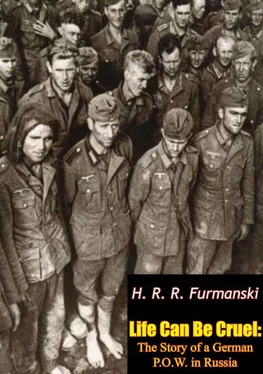Soon after this incident our battalion left for France. In August we came to St. Lô in Normandy. St. Lô was an old town, and here too I made many friends. My knowledge of the French language made it easy for me to get along, and I found a very good quarter for our ambulance. The director of the Assurance Sociale gave me permission to take over the second flat in his building. As I came to ask him, I saw that he was a veteran of World War I, and I gave him the salute of honor and asked him politely. After this we became friends. Later on he invited me to dinner in his family home, and we had a very pleasant evening.
I had met many interesting people in these years, enjoyed my stay in their countries and made friends everywhere, but now I was anxious to go home. This, of course, was impossible, while the war still raged in Europe. I was afraid of what was coming, for, though I was safe in the army of occupation, there was no certainty that I would not be sent to the battle areas.
Another order came: Paris. I was happy to see Paris. Everything I had heard about Paris was beautiful—like the city itself. In my spare time I strolled down the Champs Elysées, Place de l’Opéra, visited St. Germain. I had time to visit the museums, churches, and galleries. I saw Montmartre, the Grave of the Unknown Soldier, Arc de Triomphe. There was much to be seen in this city of beauty, and I was eager to see more and more of the scenery of the surrounding countryside. I loved the French people and truly believed that they loved me. My mother’s teaching about respecting my neighbor brought me the confidence and love of those to whom I applied it.
I spent almost two years in France. After leaving Paris I was stationed in Dijon, a very old and very beautiful town. Here too I found many friends whom I wished never to leave. The situation grew more serious when Germany declared war on Russia. All of us looked to the future with misgivings. I prayed that I might be spared actual combat; I was not a hero, and up until now I had neither seen nor heard a bullet. The future frightened me; every single day I was glad to be alive, and I prayed for an end to this war against which my nature rebelled. I had no idea how bad things were going to be. In my letters to my parents I made no effort to disguise my feeling about war, my native repugnance to the occupation. I was convinced that Germany could not win, and begged my parents many times to sell our property in East Prussia and to move to the western border of Germany. I do not know if they ever received these letters.
In April, 1942, I was ordered to the front. I traveled from Dijon to the place of appointment in middle Germany, but bypassed the garrison and went home to East Prussia. My parents were surprised to see me, having had no notice that I was coming. After being away for three years, three days were entirely insufficient in which to tell them about all my experiences and thoughts, and many things that I told had better been left unsaid; but my mother understood me perfectly. All too soon the three days were gone, and I bade my parents goodbye, knowing this time that it would be for a very long time, perhaps forever. As I hugged my mother I cried like a small boy, wondering if I would ever see her again. My mother’s eyes were dry, but I know there were tears in her heart, for she must have known that this was goodbye forever. It was perhaps a blessing, at this time, that we could not see into the future.
I left my hometown alone, none of my family accompanying me to the station. My mind was filled with sadness, and I asked God for help and understanding of this situation. A fear of the unknown, as well as a fear of losing my parents, hung like a dark cloud over me. To my question—if the Lord had forgotten me or if I had forgotten the Lord—I could find no answer. My way was prescribed for me, and no alternate course was open to me.
Soon I came at the place of appointment, where I waited for further orders. After one week I was ordered to replace an ambulance attendant in the front lines deep in Russia. Until now I had no real conception of what war really means, and my heart was filled with fear and sadness, though outwardly I tried to be courageous, and nobody saw I was frightened of the coming days. Fourteen days took us to our destination, and they were fourteen days and fourteen nights of sorrow and fear. I was to be an ambulance attendant—a human being going into war to help others, going where people were killing each other. I often wondered whether this was kindness or cruelty.
My mind, wandering back to childhood, could not help but reflect how wonderful life had been during my school days, with all my friends about me, and with the love and companionship of my parents and sister. Who could say what life would be like after this terrible nonsensical war? I didn’t know it, but I was now embarking on the cruelest period of my life.
On the night of the fourteenth day we came to our destination, perhaps ten miles behind our lines. As soon as the train stopped we had to get off at once; the Russians had learned about this transport and were firing upon it with long-range cannons. It was a harrowing experience. Under the cannonade we marched to our unit, a seemingly endless march. The entire horizon seemed to be aflame, the projectiles falling and exploding about us. The road was covered with dead horses, soldiers, and burning wagons and cars. We stumbled along, not knowing which one of us would be hit next. At dawn the next day I came to my unit, where I was to replace the ambulance attendant they had lost. My superior officer told me that we were now in the second line of fire, but that tomorrow we would have to relieve the front line and some casualties were expected. The relief was planned for noontime.
Between dawn and noon of that day I kept silent, talking with my soul and praying to God to keep me strong and calm, also asking blessings for my parents. The hands of the clock kept moving, the strain on our nerves growing with each second. We all felt this, smoking one cigarette after another, waiting for the signal to relieve the front line. The order to form a line-up came like a fanfare, everyone putting out his cigarette, pulling on his helmet and getting ready to move. We had to cross an open field, though the Russian soldiers were on the other side upon a hill where they had a very good view of us, firing upon us as soon as we started to come out of our dugout. My job began right now: everywhere there was somebody hit who was crying for help.
I wanted to cry when I came to my first wounded soldier. One of his legs was torn off at the trunk. I knelt down and tried with shaking hands to give him first aid, put him in my tent-cloth and dragged him back to the medical tent. All around us the bombs and grenades shook the ground, but I made it to the tent with my wounded fellow man.
I was pale and scared when at last we reached safety. After a short prayer I went again to fulfil my mission. Late in the afternoon, crawling and running, we had reached the front line, but the loss of soldiers was enormous.
During the next few weeks we didn’t leave our trench, for the Russians fought for every inch of ground they lost, many thousands of bullets and grenades being exchanged between both armies. We lost many soldiers, but replacements came every week. This position was held for almost four weeks; then the order came from army headquarters to take the position from the enemy. The attack was set for 4:00 A.M. the next day. Stukas and fighter planes came howling nearer, and at precisely 4:00 A.M. the bombs exploded in the Russian line. It sounded as if the earth were bursting. This offensive took the Russians by surprise, the survivors drawing back several miles. As soon as we had taken possession of their trenches we found that we had been fighting against women, for there were few men among the dead.
Читать дальше












